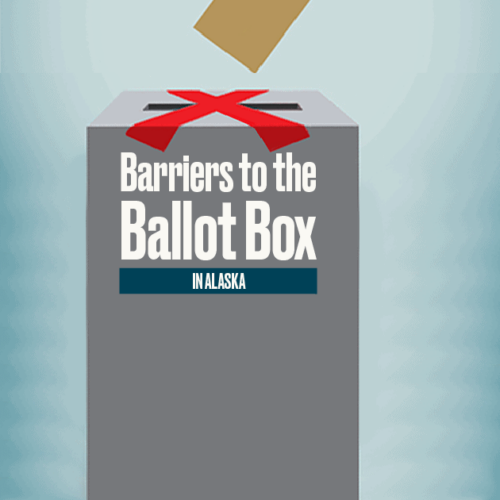Introduction
Alaska’s native communities and voting rights advocates scored a legal victory last week that makes it easier to vote — for the 2020 general election, at least.
Ordinarily, the state requires voters to get their absentee ballots signed by a witness, but the Alaska Supreme Court ruled last week that witness signatures would not be required this year due to the COVID-19 pandemic.
Sign up for The Moment newsletter
Our CEO Susan Smith Richardson guides you through conversations and context on race and inequality.
The court’s decision particularly impacts Native American voters, many of whom live in isolated villages, said Megan Edge, director of communications for the American Civil Liberties Union of Alaska. Before the court’s decision, voters had to find an adult to sign their ballots, but postal workers weren’t allowed to be witnesses.
It was “a huge hit for remote places, because sometimes the postal worker is the only person that you see today or this week,” Edge said. “These are primarily indigenous communities. These are Alaskan native voices that are being muzzled.”
After the pandemic is over, witnesses will once again be required.
Here’s a look at some of the other barriers to voting access and voting rights in Alaska:
Clerical hurdles
A community of 130 residents relocated to Mertarvik because climate change was causing erosion in nearby Newtok, but the state’s election officials weren’t aware until a week before the Aug. 18 primary. Then a delay in shipping materials prevented absentee ballots from reaching the residents.
The residents who remained in Newtok also did not receive voting materials.
It’s one example of problems with the administration of elections this year that advocates worry will happen again during the general election.
“The piece that makes this more concerning to us is the lack of transparency that Alaskans are getting from the state,” Edge said. “There are lingering questions following the primary and why that happened or what they’re going to do to prevent that from happening again.”
Another community, Clark’s Point, was unable to hold a municipal election because the state failed to provide poll workers, as they often do in many rural communities.
A bipartisan group of nine state lawmakers recently asked the state’s lieutenant governor to ensure that rural communities won’t face similar issues in the general election.
“We cannot dismiss the fact that this election cycle has been plagued with mishaps and confusion that have produced rejected ballots, lost votes and ultimately, will result in many voices in far-flung communities that will go unheard,” lawmakers wrote in the Oct. 13 letter.
Unreliable mail and a shortage of poll workers
Several states are widening the use of mail-in ballots to make it easier for voters who are worried about contracting a deadly disease. But it’s almost a moot point in Alaska.
Whether you live in a remote indigenous village or in an urban area, such as Anchorage, mailing anything in Alaska can take time, Edge said — especially in October and November, when winter storms have started to hit.
In-person voting locations are essential, she said. This year has been especially challenging because there’s a shortage of people who are willing to work at polling places due to the pandemic, Edge said. Several areas are at risk of not having an in-person polling place on Nov. 3.
“In small, rural communities, recruiting enough poll workers is difficult, even in favorable circumstances,” Edge said.
Felony disenfranchisement
Alaskans who are convicted of felonies are barred from voting until they are released from prison and complete probation or parole.
Once they complete their state supervision, they must apply to have their rights restored, Edge said.
Voting rights advocates say excluding residents with felony convictions from the ballot box disproportionately disenfranchises people of color.
Read more in Money and Democracy
US Polling Places
Early voter-registration deadline can trip up New Yorkers, but voting gets easier
New York now offers early voting and temporarily expanded mail-in ballot access. But it’s not among the states allowing Election Day registration.
US Polling Places
In Alabama, a long history of suppressing Black votes continues
The fight over absentee ballots, poor outreach and lax management sow confusion.


Join the conversation
Show Comments